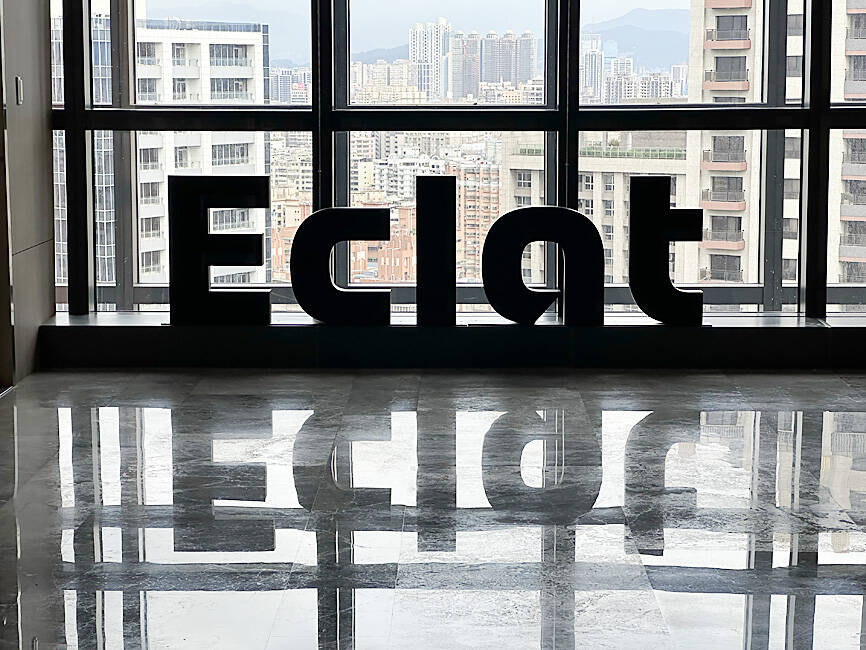Eclat Textile Co (儒鴻) is optimistic about its business outlook this year as it has clear order visibility for the next six months, the garment and fabric supplier said yesterday.
The company said its orders are mostly confirmed for the first half of this year and it has begun to receive new orders for the third quarter.
In addition, the company has seen stronger order growth from mid-sized and high-priced brand clients, it said, adding that the addition of six new customers last year would help contribute about 15 percent to its revenue this year.

Photo: Fang Wei-chieh, Taipei Times
Eclat, which counts global brands such as Nike Inc, Gap Inc, Target Corp, Lululemon Athletica Inc and Under Armour Inc among its top customers, has fabric operations in Taiwan and Vietnam, as well as garment plants in Vietnam, Cambodia, Lesotho, China and Indonesia.
The company said its garment plants have all been running at full capacity, with its outsourced capacity contribution estimated to rise to 30 percent this quarter, from 25 percent last quarter, indicating solid order recovery.
Eclat’s net profit in the fourth quarter last year was NT$1.39 billion (US$44.1 million), up 76.69 percent annually, or earnings per share of NT$5.1.
The increase was buoyed by higher revenue during the October-to-December quarter, which grew 11.3 percent annually to NT$8.49 billion, while gross margin and operating margin improved annually to 32.51 percent and 22.83 percent, respectively, company data showed.
Despite a notable sales recovery and a reversal of declining profit during the final quarter of last year, last year’s overall net profit was still down 23.77 percent annually to NT$5.18 billion and full-year revenue fell 22 percent to NT$30.79 billion due to customers' inventory adjustments.
Earnings per share were NT$18.87 last year, down from NT$24.75 in 2022, but gross margin increased by 3.59 percentage points to 31.44 percent and operating margin rose 1.5 percentage points to 21.28 percent, company data showed.
The increases in margins last year were mainly due to higher factory utilization, better production efficiency, improved product mix and inventories of low-priced raw materials, Eclat vice president for finance and accounting Roger Lo (羅仁傑) said.
Last year, the garment business accounted for 62 percent of the company’s total sales, with the fabric business taking the remaining 38 percent, Eclat vice chairman Richard Wang (王樹文) said.
Looking ahead, Wang said he is not pessimistic about the North American market this year and expects growth momentum to be better than last year, as customers have started to place long-term orders instead of rush orders.
In addition, large brands and channel customers remain active in placing orders, while order momentum from medium-sized brand clients is also quite strong, he said.
The company plans to expand capacity at its Indonesian plants this year and expects new production lines to make a substantial revenue contribution from the second quarter of next year, he added.

In Italy’s storied gold-making hubs, jewelers are reworking their designs to trim gold content as they race to blunt the effect of record prices and appeal to shoppers watching their budgets. Gold prices hit a record high on Thursday, surging near US$5,600 an ounce, more than double a year ago as geopolitical concerns and jitters over trade pushed investors toward the safe-haven asset. The rally is putting undue pressure on small artisans as they face mounting demands from customers, including international brands, to produce cheaper items, from signature pieces to wedding rings, according to interviews with four independent jewelers in Italy’s main

Japanese Prime Minister Sanae Takaichi has talked up the benefits of a weaker yen in a campaign speech, adopting a tone at odds with her finance ministry, which has refused to rule out any options to counter excessive foreign exchange volatility. Takaichi later softened her stance, saying she did not have a preference for the yen’s direction. “People say the weak yen is bad right now, but for export industries, it’s a major opportunity,” Takaichi said on Saturday at a rally for Liberal Democratic Party candidate Daishiro Yamagiwa in Kanagawa Prefecture ahead of a snap election on Sunday. “Whether it’s selling food or

CONCERNS: Tech companies investing in AI businesses that purchase their products have raised questions among investors that they are artificially propping up demand Nvidia Corp chief executive officer Jensen Huang (黃仁勳) on Saturday said that the company would be participating in OpenAI’s latest funding round, describing it as potentially “the largest investment we’ve ever made.” “We will invest a great deal of money,” Huang told reporters while visiting Taipei. “I believe in OpenAI. The work that they do is incredible. They’re one of the most consequential companies of our time.” Huang did not say exactly how much Nvidia might contribute, but described the investment as “huge.” “Let Sam announce how much he’s going to raise — it’s for him to decide,” Huang said, referring to OpenAI

The global server market is expected to grow 12.8 percent annually this year, with artificial intelligence (AI) servers projected to account for 16.5 percent, driven by continued investment in AI infrastructure by major cloud service providers (CSPs), market researcher TrendForce Corp (集邦科技) said yesterday. Global AI server shipments this year are expected to increase 28 percent year-on-year to more than 2.7 million units, driven by sustained demand from CSPs and government sovereign cloud projects, TrendForce analyst Frank Kung (龔明德) told the Taipei Times. Demand for GPU-based AI servers, including Nvidia Corp’s GB and Vera Rubin rack systems, is expected to remain high,